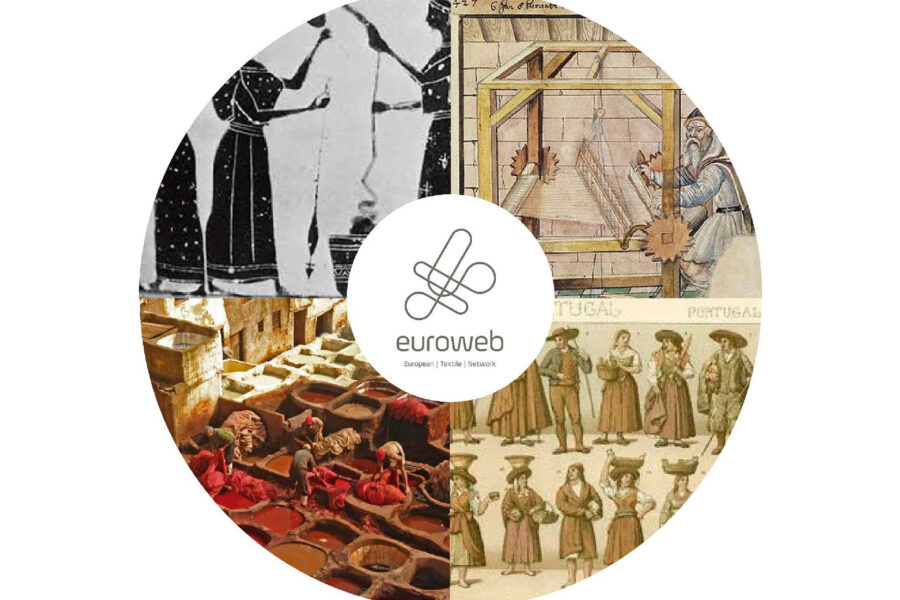
Digital EuroWeb Workshop “Spinning, Weaving, Dyeing and Sewing”
This online workshop, supported by the Action and co-organized by members Catarina Costeira, Joana Sequeira, Paula Nabais, Maria João Melo, and Francisco B. Gomes, gathered a large group of Portuguese EuroWeb members, as well as other national researchers whose work focuses on textiles and textile activities, from production to usage, crossing different disciplinary and methodological outlooks. The goal of this meeting was not only to propitiate dialogue and collaboration among the participants, but also to map the working current taking place and the skill sets available within the Portuguese team. It was also aimed at identifying existing gaps regarding know-how and resources which can be bridged by making a good use of the opportunities offered by EuroWeb.
A total of 47 speakers took part in this meeting, hailing from different disciplinary fields, from Archaeology and History to Conservation Sciences, and also including Anthropology, Ethnobotanics and Art History. These included the keynote speakers, Marie Louise Nosch, Karina Grömer, Zvi Koren, Eva Andersson Strand, Agata Ulanowska, and the team of the Digital Atlas of European Textile Heritage (Angela Huang, Catarina Costeira, Alina Iancu, Mikkel Nørtoft e Piotr Kasprzyk).
The interventions, 23 in total, were organized in three panels: Panel 1 focused on archaeological data and their interpretation; Panel 2 dealt mostly with the study of natural dyes in textile production; and finally, Panel 3 explored the role of textiles, textile production and costume in the Medieval and Modern Periods.
Thanks to the commitment of all the speakers, the results of this meeting were very positive. It was in fact possible to form a clearer picture both of those fields in which the Portuguese team can contribute to the global goals of the Action – with archaeological and anthropological data, innovative methods for the study of natural dyes, and an extensive know-how on the interpretation of different sources for the study of medieval and early modern textiles – but also to map the areas which are worth further exploration and a renewed strategic investment in the framework of EuroWeb.
This online workshop, supported by the Action and co-organized by members Catarina Costeira, Joana Sequeira, Paula Nabais, Maria João Melo, and Francisco B. Gomes, gathered a large group of Portuguese EuroWeb members, as well as other national researchers whose work focuses on textiles and textile activities, from production to usage, crossing different disciplinary and methodological outlooks. The goal of this meeting was not only to propitiate dialogue and collaboration among the participants, but also to map the working current taking place and the skill sets available within the Portuguese team. It was also aimed at identifying existing gaps regarding know-how and resources which can be bridged by making a good use of the opportunities offered by EuroWeb.
A total of 47 speakers took part in this meeting, hailing from different disciplinary fields, from Archaeology and History to Conservation Sciences, and also including Anthropology, Ethnobotanics and Art History. These included the keynote speakers, Marie Louise Nosch, Karina Grömer, Zvi Koren, Eva Andersson Strand, Agata Ulanowska, and the team of the Digital Atlas of European Textile Heritage (Angela Huang, Catarina Costeira, Alina Iancu, Mikkel Nørtoft e Piotr Kasprzyk).
The interventions, 23 in total, were organized in three panels: Panel 1 focused on archaeological data and their interpretation; Panel 2 dealt mostly with the study of natural dyes in textile production; and finally, Panel 3 explored the role of textiles, textile production and costume in the Medieval and Modern Periods.
Thanks to the commitment of all the speakers, the results of this meeting were very positive. It was in fact possible to form a clearer picture both of those fields in which the Portuguese team can contribute to the global goals of the Action – with archaeological and anthropological data, innovative methods for the study of natural dyes, and an extensive know-how on the interpretation of different sources for the study of medieval and early modern textiles – but also to map the areas which are worth further exploration and a renewed strategic investment in the framework of EuroWeb.